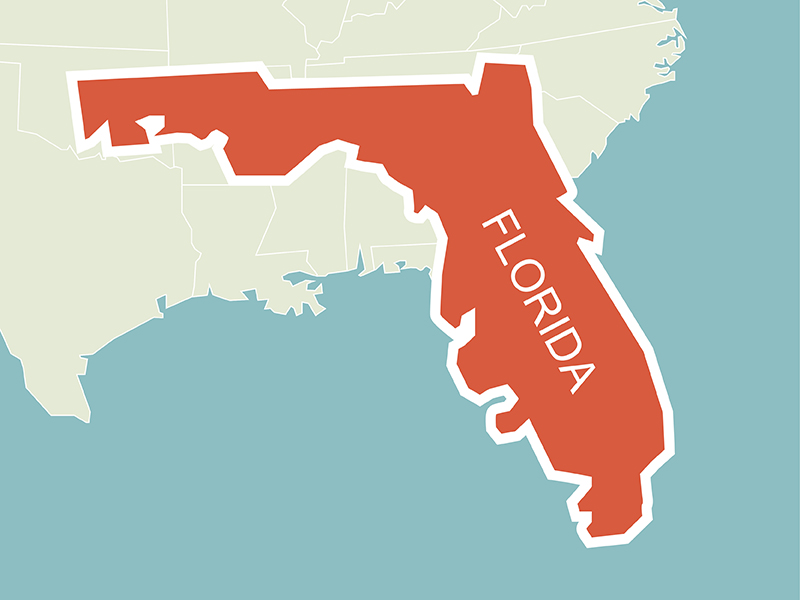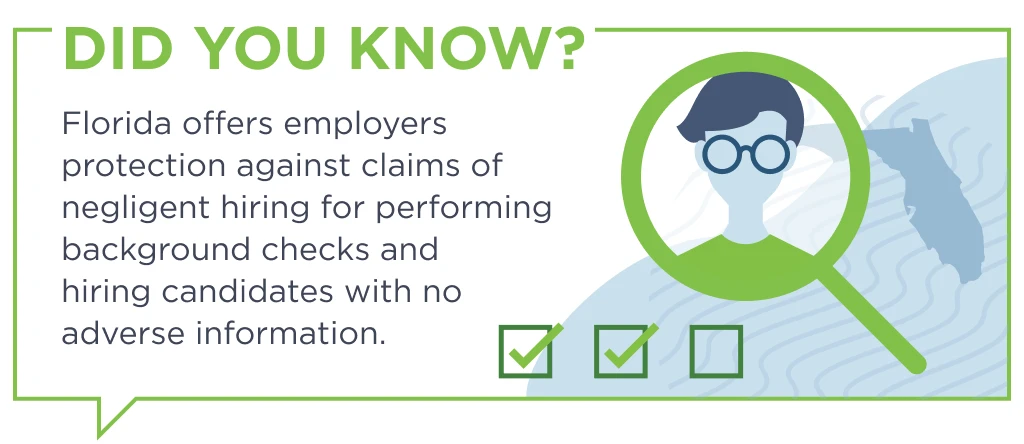
Table of Contents
Employers find pre-employment background screenings invaluable in aiding them to make informed hiring decisions. These screenings delve into various aspects of a job applicant’s background, such as education, work experience, professional credentials, and beyond. By conducting criminal background checks, companies not only prioritize safety for both employees and customers but also safeguard themselves against potential legal risks.
This comprehensive overview of background checks in Florida encompasses the range of screening options available to employers, the potential information they may reveal, and an introduction to the federal, state, county, and city regulations that govern background screenings for employment purposes.
Employers in Florida have the flexibility to conduct various background screenings based on federal, state, and local regulations and the specific requirements of the positions they are filling. These screenings may encompass federal, national, state, and county databases, among other sources. Florida’s employment background checks typically involve:
- Verification of employment to ensure candidates accurately represent their work history.
- Validation of education to confirm attendance at schools and attainment of degrees.
- Drug testing to detect the presence of substances. Florida-based employers adhering to state guidelines for drug-free workplace programs may qualify for insurance discounts on workers’ compensation.
- Examination of driving records by searching state motor vehicle records (MVR) for details such as license status, class, and traffic infractions. MVR checks are commonly used for roles requiring vehicle or equipment operation on behalf of the company.
- Criminal background checks to scrutinize national, state, and/or local criminal records.
BACKGROUND CHECKS FOR STATE AGENCIES & REGULATED INDUSTRIES
For employers mandated by FL Statute 435.02, particularly those in childcare and healthcare sectors, there are two specific types of criminal background checks. These regulated industries must conduct Level 1 and Level 2 checks directly through local, state, and federal law enforcement agencies as stipulated by FL Statute 943.0542.
However, entities beyond these regulated sectors aren’t limited to Level 1 and Level 2 checks. They have the option to engage third-party background check providers, such as Rapid Hire Solutions, to conduct Florida background checks for employment purposes. Even regulated employers subject to Level 1 and Level 2 checks may choose to collaborate with third-party providers for supplementary checks or preliminary investigations preceding Level 1 or Level 2 screenings.
Level 1 Background Check Florida
In Florida, for state agencies and regulated industries, a Level 1 background check relies solely on the candidate’s name (as opposed to fingerprints, utilized in a Level 2 check). A Level 1 check encompasses:
- Confirmation of employment history.
- Examination of statewide criminal records.
- Verification through the Dru Sjodin National Sex Offender Public Website.
Additionally, hiring agencies have the option to supplement these checks with local criminal records inquiries via local law enforcement agencies. While a Level 1 background check may indicate the presence of a criminal record, it doesn’t provide specifics regarding the offenses.
Level 2 Background Check Florida
In Florida, for state agencies and regulated industries, a Level 2 background check involves fingerprint-based examination of state and national criminal records. These comprehensive searches have the potential to uncover records that might elude detection in a name-based Level 1 background screening. State records inquiries are conducted via the Florida Department of Law Enforcement, while national criminal records searches are carried out through the Federal Bureau of Investigation.
Additionally, Level 2 checks may encompass local criminal records maintained by local law enforcement agencies in certain instances. Furthermore, a Level 2 check indicates whether a candidate is designated as a sex offender either in Florida or in the national registry, thus obviating the need for a separate sex offender registry check.
It’s worth noting that Level 1 and Level 2 background checks in Florida are mandated solely for state agencies and specific industries. The majority of organizations in Florida can conduct standard employment screenings through a Consumer Reporting Agency (CRA) like Rapid Hire Solutions.
How Far Back Does A Background Check Go In Florida?
In Florida, state law doesn’t impose limitations on the timeframe for background checks. Most screenings, including criminal records checks, extend indefinitely.
However, employers conducting criminal background checks in Florida should acknowledge the presence of local ban-the-box laws, which may regulate the consideration of criminal record information in the hiring process.
Florida background checks must adhere to the federal Fair Credit Reporting Act (FCRA), which prohibits consumer reporting agencies (CRAs) from reporting:
- Title 11 bankruptcies older than 10 years from the date of the report.
- Civil suits, civil judgments, and arrest records older than seven years from the date of the report.
- Paid tax liens older than seven years from the date of the report.
- Any collections older than seven years from the date of the report.
- Any adverse information (excluding criminal convictions) older than seven years from the date of the report.
When conducting nationwide background screenings, employers in Florida should be mindful of varying state and jurisdictional regulations regarding the timeframe for background checks. While some US states permit CRAs to report criminal records indefinitely, others limit reporting to seven years.
Florida Background Check Laws
Unlike certain states, Florida state law doesn’t constrain employers’ capacity to conduct criminal background checks. There are no statewide ban-the-box or fair hiring laws in Florida; however, certain counties and cities have implemented their own ban-the-box and fair hiring regulations.
In fact, Florida incentivizes employers to carry out background checks by providing them with protection against allegations of negligent hiring. If an employer conducts a background check in Florida, including a criminal records check through the Florida Department of Law Enforcement, and uncovers no disqualifying information about the candidate, state law presumes that the company acted non-negligently in its hiring decision.

Florida has enacted a statewide law mandating landlords to conduct background checks as a prerequisite for employment. Known as Senate Bill 898 or “Miya’s Law,” this legislation necessitates that the screening be facilitated through a Consumer Reporting Agency (CRA) and encompass a comprehensive examination of criminal history and sex offender registries across all 50 states and the District of Columbia. Applicants may face disqualification if convicted of specific offenses involving violence and disregard for safety.
COMPLIANCE WITH THE FCRA
In terms of compliance with the Fair Credit Reporting Act (FCRA), all Florida employers are obligated to adhere to this federal law regulating background checks.
Under the FCRA, employers must provide candidates with written notice of their intent to conduct a background check and inform them that the results may influence hiring decisions. Candidates must also provide their signed consent for the background check.
Following the completion of the background check but prior to reaching a hiring verdict, employers must apprise candidates of their FCRA rights and allow them the opportunity to review their background check reports.
If an employer opts not to hire or promote a candidate based on the background check findings, they must furnish the candidate with written notice of this decision (referred to as a pre-adverse action notification) and afford them the chance to contest or explain the information in the report before making a final determination. If the final decision remains adverse, the employer must then issue a final adverse action notice to the candidate.
It’s important to note that local ban-the-box laws at the county and city levels may impose stricter requirements compared to the FCRA. When uncertain, adhering to the most stringent applicable law will ensure compliance with background check protocols.
County Resources
ALACHUA COUNTY
Alachua County, situated in the north-central region of Florida, boasts abundant natural attractions, characteristic of much of the state. With a population of 278,468 spread across 875 square miles, the county’s largest city, Gainesville, is renowned for hosting the University of Florida, a significant local employer.
Public Information & Records:
The city of Gainesville has a ban-the-box law.
BREVARD COUNTY
This coastal county of 606,612 people borders the Atlantic. Its 1,015 square miles are home to plenty of sunny beaches and the famous Cape Canaveral. Palm Bay, Melbourne, and Titusville are Brevard County’s biggest cities; healthcare, hospitality, and manufacturing are key industries.
Public Information & Records:
BROWARD COUNTY
With 1.94 million people in 1,209 square miles, Broward County is the second-most populous county in Florida and the 17th most populous in the US. This ethnically diverse region is a top destination for travelers from around the world. Fort Lauderdale, Pembroke Pines, and Hollywood are its biggest cities.
Public Information & Records:
Broward County has a ban-the-box law, as do two cities within the county: Pompano Beach and Tamarac.
DUVAL COUNTY
Although much of this 762-square-mile county is inland, Duval County still boasts 20 miles of beaches and nearly 40 miles of intracoastal waterway canals. Its government is consolidated with the City of Jacksonville, the county’s biggest city and home to more than 856,000 of the county’s 995,567 residents.
Public Information & Records:
Jacksonville has a ban-the-box law.
HILLSBOROUGH COUNTY
With a population of 1.45 million in 1,020 square miles, this Western Central Florida county features 158 miles of shoreline on Tampa Bay. Tampa is its biggest city, followed by Brandon and Riverview.
Public Information & Records:
The city of Tampa has a ban-the-box law.
LEE COUNTY
Lee County is famous for its beaches, fishing, boating, and golf. Located on the Gulf Coast, it has 760,822 residents in 784 square miles. The biggest cities are Cape Coral, Lehigh Acres, and Fort Myers.
Public Information & Records:
There is a ban-the-box law in Fort Myers.
LEON COUNTY
This 667-square-mile county is in the Florida Panhandle. Most of Leon County’s 292,198 residents are concentrated in Tallahassee, which is divided into Tallahassee Central, Northwest, Northeast, South, East, and Southwest. Tallahassee is also the state capital and home to Florida State University and Florida A&M University; the state government and the universities are major employers.
Public Information & Records:
The city of Tallahassee has a ban-the-box law.
MIAMI-DADE COUNTY
On the east side of Florida’s southernmost tip, Miami-Dade County has 2.7 million residents, making it Florida’s most populous county and the seventh-most populous county in the US. Its 1,897 square miles include urban areas like Miami Beach, agricultural communities, and many global corporate headquarters. Miami and Hialeah are the largest cities.
Public Information & Records:
Miami-Dade County has a ban-the-box law.
ORANGE COUNTY
Orange County is part of the Orlando metro area, home to Universal Orlando Resort, Walt Disney World, Kennedy Space Center, and SeaWorld, among other popular vacation destinations. It covers 903 square miles and has 1.4 million residents; Orlando and Alafaya are the biggest cities.
Public Information & Records:
The city of Orlando has a ban-the-box law.
PALM BEACH COUNTY
Part of the Miami metro area, Palm Beach County has 1.4 million residents in 1,969 square miles. West Palm Beach, Boca Raton, and Boynton Beach are the biggest cities in this county, which boasts 47 miles of Atlantic coastline, is home to more billionaires than any other Florida city, and is known as “The Golf Capital of Florida.”
Public Information & Records:
PASCO COUNTY
Many of this bedroom community’s 561,891 residents work in Tampa. Known as the nudist capital of the US, Pasco County covers 746 square miles. Wesley Chapel, Land ’O Lakes, and Bayonet Point are its largest cities.
Public Information & Records:
PINELLAS COUNTY
Surrounded by water on three sides, Pinellas County is a 273-square-mile peninsula bounded by the Gulf of Mexico on the west and by Tampa Bay on the south and east. Its beaches and sand dunes are major tourist attractions; it’s also a popular retirement spot. The population is 959,107; Saint Petersburg, Clearwater, and Largo are the biggest cities.
Public Information & Records:
Two Pinellas County cities, Clearwater and St. Petersburg, have ban-the-box laws.
POLK COUNTY
Spanning 1,797 square miles, Polk County benefits from its central location between the Tampa and Orlando metro areas. Retail and healthcare are major industries for its 725,046 people. Lakeland, Poinciana, and Winter Haven are the biggest cities.
Public Information & Records:
SARASOTA COUNTY
White sand beaches attract tourists and residents alike to this Gulf Coast county, whose biggest cities are North Port and Sarasota. Sarasota County has 434,006 residents in 555 square miles.
Public Information & Records:
The city of Sarasota has a ban-the-box law.
SEMINOLE COUNTY
Seminole County is centrally located, and its 309 square miles are close to airports, ports, and colleges. Sanford, Altamonte Springs, and Oviedo are the biggest cities in the county, which has 470,856 residents.
Public Information & Records:
VOLUSIA COUNTY
Manufacturing is a major industry in this growing region, which boasts both beachside and inland attractions. Its 1,101 square miles are home to the Daytona International Speedway. Deltona, Daytona Beach, and Port Orange are the biggest cities in this county of 553,543 people.
Public Information & Records:
The city of Daytona Beach has a ban-the-box law.
Get A Florida Background Check With Rapid Hire Solutions
Florida imposes fewer regulations on employer background screenings compared to many other states. However, conducting a background check in Florida can significantly mitigate the risk of negligent hiring charges, making it a crucial step in the hiring process. Florida employers are obligated to adhere to the Fair Credit Reporting Act (FCRA), and the presence of ban-the-box laws in certain Florida cities and counties may introduce additional complexities.
Employers can enhance their confidence by engaging a third-party background check provider, such as Rapid Hire Solutions, to conduct their Florida background checks. Rapid Hire Solutions offers a comprehensive array of FCRA-compliant background check services, furnishing the necessary information to facilitate informed hiring decisions. Our expedient and precise background screenings incorporate built-in compliance tools designed to streamline background check review processes and navigate the adverse action procedure with ease. Should further assistance be required, Rapid Hire Solutions’ in-house background check experts are readily available to address any inquiries.
DISCLAIMER
The resources provided here are for educational purposes only and do not constitute legal advice. We advise you to consult your own counsel if you have legal questions related to your specific practices and compliance with applicable laws

